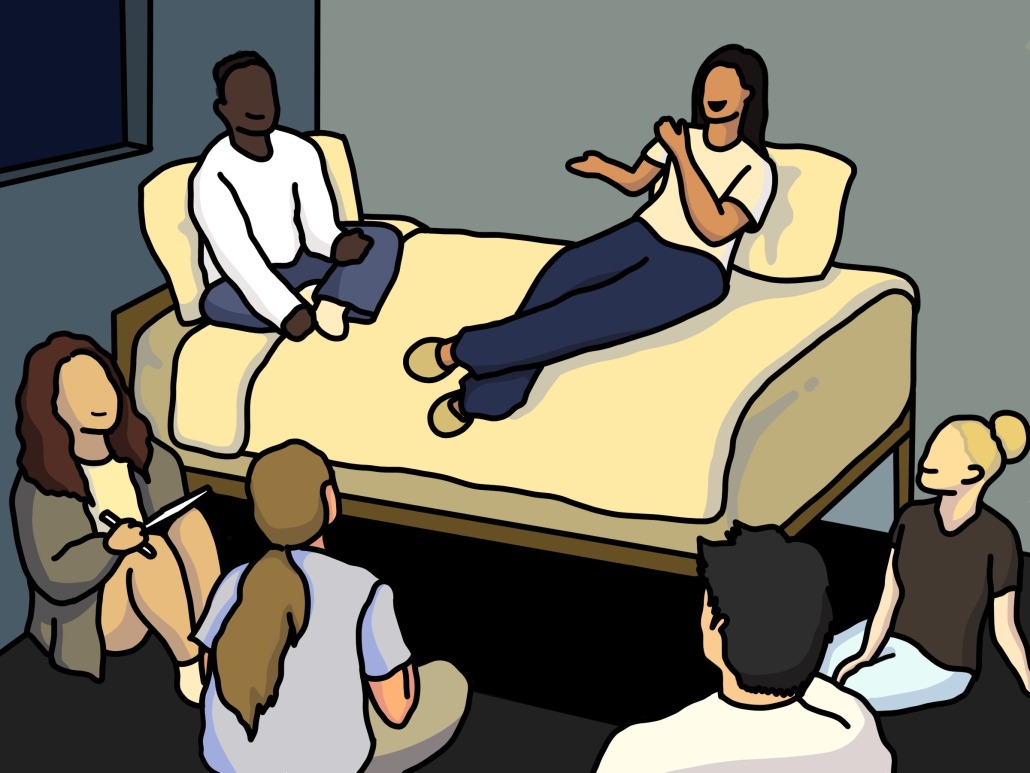If you just met me and had to summarize me in three sentences, it would probably be the following: I have a smart-sounding major, I refuse to go to Japanese restaurants because I hate sushi (hot take but I stand by it) and I yap … a lot. While I wish I could say this yapping is a recent phenomenon, I have actually been suffering from the yaps since the tender age of three. One teacher went to the extreme lengths of confiscating my desk because she said I didn’t need it — after all, I was always too busy dilly-dallying around the classroom to chat with my friends to ever use it.
Cut to college, where, as a spring admit, I was even more eager to rush the process of finding my support system. In my attempt to do so, I opened up to every Tom, Dick and Harry — an unwise choice. A lot of random people knew random facts about my life, which seemed super necessary at that point. In hindsight, the guy in my math class didn’t need to know about my nightmare about accidentally killing a cat and being chased with pitchforks as crowds chanted, “Cat Killer!”
Daily headlines, sent straight to your inbox.
Subscribe to our newsletter to keep up with the latest at and around USC.
While some of my current close friends say they admired my ability to open up so easily and talk about myself, I often wonder why they didn’t join in by yapping about themselves. Instead, they were more cautious and scoped out our potential to be close before revealing their thoughts. Maybe, instead of naively following my childhood tendency to talk, I should have followed their suit.
This would have avoided the power imbalance between us, where I felt extremely vulnerable without it being reciprocated. I realized that I had no basis to trust these people — should I really trust someone just because they lived with me or they were Indian like me or because we were in the same group for a class? I spent a lot of time drowning in a sea of paranoia, wondering when one of the billion people I trusted would reveal my secrets and make me into the laughing stock of USC.
While thankfully no one abused this power — unless the random guy from math is now talking about the crazy girl from math who dreams about killing cats — it made me realize that in my desperation to find a support system in this unfamiliar environment, I was being too casual with who I trusted. Determining who I feel close enough to be vulnerable with requires thought and attention, which cannot be hastened.
It’s a mistake to constantly talk about yourself without pausing to give others the chance to do so, too. Not only because listening to others is the nice and not self-centered thing to do, but because for a truly close relationship to be forged, both people need to be able to open up. A support system is not a one-way street — rather, you both need to be able to support each other. It’s about finding people who will be there in your time of need and also people who you want to be there for during their moments of struggle. So, from one yapper to another, here is a piece of advice: yappers also need to be good listeners.
Edhita Singhal is a junior writing about life lessons she has learned in college in her column, “Thinking Out Loud,” which runs every other Wednesday.
DONATION PLUG – PLEASE DO NOT TOUCH
Thank you for reading the Daily Trojan.
We are the only independent newspaper here at USC, run at every level by students. That means we aren’t tied down by any other interests but those of readers like you: the students, faculty, staff and South Central residents that together make up the USC community.
Independence is a double-edged sword: We have a unique lens into the University’s actions and policies, and can hold powerful figures accountable when others cannot. But that also means our budget is severely limited. We’re already spread thin as we compensate the writers, photographers, artists, designers and editors whose incredible work you see in our daily paper; as we work to revamp and expand our digital presence, we now have additional staff making podcasts, videos, webpages, our first ever magazine and social media content, who are at risk of being unable to receive the support they deserve.
We are therefore indebted to readers like you, who, by supporting us, help keep our paper daily (we are the only remaining college paper on the West Coast that prints every single weekday), independent, free and widely accessible.
Please consider supporting us. Even $1 goes a long way in supporting our work; if you are able, you can also support us with monthly, or even annual, donations. Thank you.











